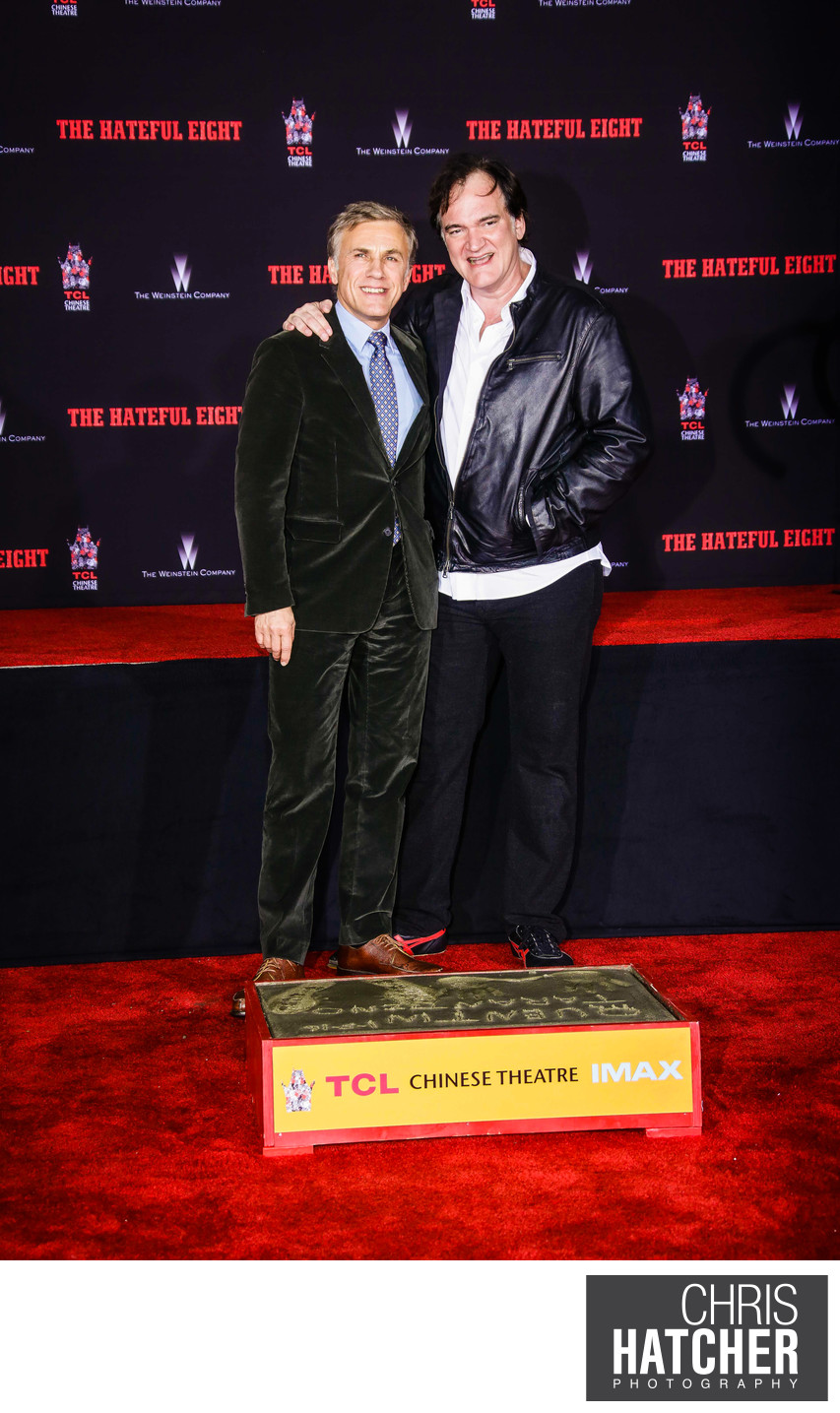
HONORED WITH HAND AND FOOTPRINT CEREMONY on January 5, 2016
Quentin Jerome Tarantino[1] (born March 27, 1963) is an American film director, writer, and actor. His films are characterized by nonlinear storylines, satirical subject matter, an aestheticization of violence, extended scenes of dialogue, ensemble casts consisting of established and lesser-known performers, references to popular culture, soundtracks primarily containing songs and score pieces from the 1960s to the 1980s, and features of neo-noir film. He is widely considered one of the greatest filmmakers of his generation.
His career began in the late 1980s, when he wrote and directed My Best Friend's Birthday, the screenplay of which formed the basis for True Romance. In the early 1990s, he began his career as an independent filmmaker with the release of Reservoir Dogs in 1992, which was coined the "Greatest Independent Film of All Time" by Empire. Its popularity was boosted by his second film, Pulp Fiction (1994), a black comedy crime film that was a major success both among critics and audiences. Judged the greatest film from 1983–2008 by Entertainment Weekly,[2] many critics and scholars have named it one of the most significant works of modern cinema.[3] For his next effort, Tarantino paid homage to the blaxploitation films of the 1970s with Jackie Brown (1997), an adaptation of the novel Rum Punch.
Kill Bill, a highly stylized "revenge flick" in the cinematic traditions of Kung fu films, Japanese martial arts, Spaghetti Westerns and Italian horror, followed six years later, and was released as two films: Volume 1 in 2003 and Volume 2 in 2004. Tarantino directed Death Proof (2007) as part of a double feature with friend Robert Rodriguez, under the collective title Grindhouse. His long-postponed Inglourious Basterds, which tells the fictional alternate history story of two plots to assassinate Nazi Germany's political leadership, was released in 2009 to positive reviews. After that came 2012's critically acclaimed Django Unchained, a Western film set in the antebellum era of the Deep South. It became the highest-grossing film of his career so far, making over $425 million at the box office. His eighth film, the mystery Western The Hateful Eight, was released in its roadshow version December 25, 2015, in 70 mm film format, complete with opening "overture" and halfway-point intermission, after the fashion of big-budget films of the 1960s and early 1970s.
Tarantino's films have garnered both critical and commercial success. He has received many industry awards, including two Academy Awards, two Golden Globe Awards, two BAFTA Awards and the Palme d'Or, and has been nominated for an Emmy and a Grammy. In 2005, he was included on the annual Time 100 list of the most influential people in the world.[4] Filmmaker and historian Peter Bogdanovich has called him "the single most influential director of his generation".[5] In December 2015, Tarantino received a star on the Hollywood Walk of Famefor his contributions to the film industry.[6]
Christoph Waltz (German: born 4 October 1956) is an Austrian actor.[1][2][3] Waltz is widely known for his works with American filmmaker Quentin Tarantino, receiving critical acclaim for portraying SS officer Hans Landa in Inglourious Basterds (2009) and bounty hunter Dr. King Schultz in Django Unchained (2012). For both performances, he earned an Academy Award, BAFTA Award and Golden Globe Award for Best Supporting Actor. Waltz also received the Best Actor Award at the Cannes Film Festival and a Screen Actors Guild Awardfor his portrayal of Landa.[4]
Waltz portrayed computer genius Qohen Leth in the sci-fi film The Zero Theorem (2013), American plagiarist Walter Keane in the biographical film Big Eyes (2014), and James Bond's nemesis Ernst Stavro Blofeld in Spectre (2015), the twenty-fourth Bond film.[5]
Grauman's Chinese Theatre is a movie palace on the historic Hollywood Walk of Fame at 6925 Hollywood Boulevard in Hollywood, California, United States. Originally known as Grauman's Chinese Theatre, it was renamed Mann's Chinese Theatre in 1973; the name lasted until 2001, after which it reverted to its original name. On January 11, 2013, Chinese electronics manufacturer TCL Corporation purchased the facility's naming rights, under which it is officially known as TCL Chinese Theatre.[2]
The original Chinese Theatre was commissioned following the success of the nearby Grauman's Egyptian Theatre, which opened in 1922. Built by a partnership headed by Sid Grauman over 18 months starting in January 1926, the theatre opened May 18, 1927, with the premiere of Cecil B. DeMille's film The King of Kings.[3] It has since been home to many premieres, including the 1977 launch of George Lucas' Star Wars,[4] as well as birthday parties, corporate junkets, and three Academy Awards ceremonies. Among the theatre's most distinctive features are the concrete blocks set in the forecourt, which bear the signatures, footprints, and handprints of popular motion picture personalities from the 1920s to the present day.
In 2013, the Chinese Theatre partnered with IMAX Corporation to convert the house into a custom-designed IMAX theater. The newly renovated theater seats 932 people and features one of the largest movie screens in North America.[1]
Location: TCL Chinese Theatre 6925 Hollywood Blvd, Hollywood, CA 90028.
Keywords: QUENTIN TARANTINO HONORED WITH HAND AND FOOTPRINT CEREMONY (5).